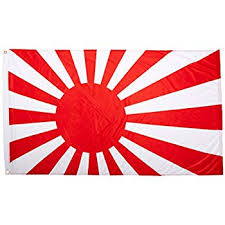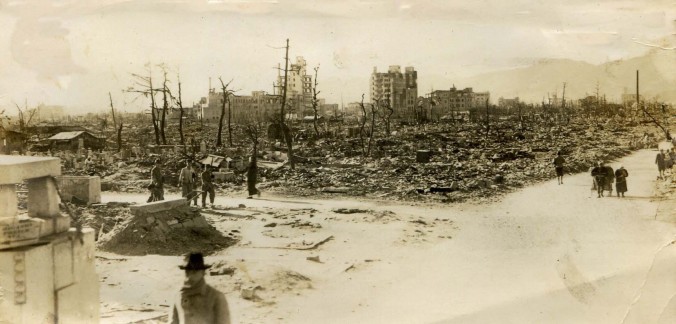I’ve never set foot in Japan, but Japan has touched me in ways obvious and ways hard to explain. The obvious is easy. I drive a Honda. I take photographs with a Canon T51 Rebel. Japan Victor Company built one of my flatscreens. Sony manufactured my home sound system. My Vortex binoculars came from Japan. I talk on Panasonic telephones.
I own so many Japanese products, I might as well move into a rice-paper house, take off my shoes, wear a kimono, grab chopsticks and live off Japan’s four food groups: fish and rice, rice and fish, fish and fish, and rice and rice. I should play that 1980’s one-hit wonder by The Vapors, “Turning Japanese,” (I really think so).
The rest is weightier. A ways back my Japanese musings took over me when I heard about Chrysler’s bankruptcy. Chrysler sits at the intersection of two key memories—a boyhood discovery and a 1956 Plymouth, turquoise and white, with large, yet delicate, fins. It’s the first car I remember Dad buying, not that long after World War II. Dad bought American-made Chrysler cars all his life.
We who buy Japanese cars drove a few nails in Chrysler’s coffin, but don’t blame us. Japanese cars last, and they embody the phoenix-like rise of a country demolished by us in a way like no other but resuscitated by us as well. From a nuclear funeral pyre, Japan rose to give us dependable cars, radios, TVs, telephones, and more. The vanquished enemy came roaring back.

The other memory goes back to childhood. Rambling through closets I discovered silk flags, relics of Dad’s time in Japan. Unfolding them, a rising sun with rays afire burst off the alabaster silk. Japan—Land of the Rising Sun.
The Imperial Japanese Navy flew those flags. So did the Japanese Army. Those flags of a brilliant sun were the last sights many warriors on both sides saw. I made parachutes of those silk flags, tying a rock to them, hurling them up, and watching them drift back to Georgia soil, incandescent with Southern light.
Somewhere in my boyhood those flags disappeared. I’d love to have one framed with an inscription. “Liberated and brought to the United States by Master Sergeant John M. Poland Jr.” With Japan’s surrender August 14, 1945, Allied Occupation Forces banned the Rising Sun flags. Maybe that’s how Dad came by them. Confiscated by the victors.
—
Dad journeyed to Japan on a troop carrier in Operation Downfall, the Allied plan to invade Japan. After steaming out of Seattle, somewhere along the way, two atom bombs brought Japan to its knees, and some 200,000 servicemen, would-be invaders, my father among them, occupied Japan instead. There was no combat, but there was a price to pay. And so, my thoughts drift to Hiroshima a lot these days. My father served in U.S. Army Ordnance and he spent time in Yokohama but he also went to Hiroshima just after the Enola Gay dropped “Little Boy.” And he went to Nagasaki.

There in the land of geishas, he might as well have been walking on the surface of the sun. He was at most 20. The things he must have seen as he tread Hiroshima and Nagasaki’s toxic soil. Skinless people. Men with stripes burnt onto their skin. When the brilliant flash hit them, the nuclear burst stenciled stripes on men and dress patterns onto women. Dad never talked about things like that, but he saw that and worse.
He returned to Georgia with evidence of his Hiroshima days: flags, photos, and later something malignant. The photos reveal block after block of charred rubble with steel beams drooping like melted candles. Nuclear detritus. Total destruction. The next time you drive past a bush-hogged cornfield, imagine it burnt to a cinder. That’s what Hiroshima looked like, a charred, mown cornfield, where not even one ant survived.
At ground zero the heat reached millions of degrees. Vaporized people left shadows etched into rock … perhaps that’s why censors placed rectangles black as midnight upon some of Dad’s photos. Why generate sympathy for the enemy. By the end of 1945, radiation and burns raised the total dead to 140,000.
Those photos told me Hell had been unleashed on Hiroshima. It didn’t come as a surprise to those in the know. Awaiting the bomb’s first test, Robert Oppenheimer, father of the atomic bomb, held onto a post to steady himself as the seconds ticked down … “3, 2, 1, Now!” A brilliant burst of light and a deep growling roar shook the earth, staggering Oppenheimer—“I am become Death, the destroyer of worlds” … words from the “Song of God,” a treasured Sanskrit Hindu scripture.
“I am become death, yes.” My father’s illness—which proved terrible beyond description—first showed itself in a common way. Choking, he gets up from the table and goes outside. He chokes on tea. In time, he fears eating. He loses weight. Month by month it worsens.
In April 2002, doctors at the Medical University of South Carolina in Charleston diagnosed Dad with esophageal cancer. In July 2002, they removed Dad’s tumor, esophagus, and larynx in a lengthy operation—12 hours—that resulted in a stoma and stomach resection so he could eat on his own, though he really never did.
In the many days during Dad’s never-realized recovery, we took slow walks with him to the tenth floor visitor’s room. We’d creep down the corridor, dragging the IV tree behind him. We’d stand before windows and look over the city with its white steeples and green live oaks. W could pick out pelicans soaring near the bridges, bridges no longer in existence.
In the months to come, Dad’s cancer returned. He had another operation at MUSC and we crossed our fingers and prayed with all our strength. Again, the cancer returned. Dad elected to undergo chemotherapy but it took a terrible toll on him and near the end he made a choice: no more chemo. As the disease progressed and he watched his body waste away, Dad took his suffering in stride. Each day he would pray “Thank you God for my family and thank you for another day of life.” Dad passed away from esophageal cancer on November 15, 2003, at 6:57 in the evening.
Now and then waiting for a traffic light to change, I think about the Hondas, Nissans, and Toyotas around me. I know that many of those cars are now made in the United States. I know, too, that many are not. I wonder about the Japanese autoworkers who make them and what life was like for their parents. Many had okasans and otousans who experienced atomic warfare like no one else has.
The bombs, they said, saved lives in the long run. The truth is many U.S. soldiers would die down the road from radiation’s long-term effects. That’s what Dad faced as his troop carrier set out of Seattle through 30-foot swells, water cresting over the prow. Men seasick. Sick down the road in fatal ways.
For the Japanese came a flash of light, fire and wind blast, and fire again, a towering mushroom cloud, black rain, people with their arm skin and fingernails sliding onto the ground, silhouettes of people burned into granite. How did the survivors carry on with their world changed forever after so many loved ones vanished into the air without a trace. I can only hope they found shelter in utter and complete insanity.
For U.S. servicemen, it was Hell and Heaven, the end of war but a headful of horrors to carry the rest of their life. Burdened with this weight, U.S. servicemen performed their duty, then returned home across the Pacific to begin life anew. Appreciating life like few of us ever will, these Atomic Veterans came home to do good. Many started families. Some bought two-tone Plymouths with big fins. Some returned with keepsakes of where they had been, flags, photographs, and things they didn’t talk about. Touched by Hiroshima, some returned with things they didn’t know they had.
It took “Little Boy” 57 seconds to fall over Hiroshima, and for some American soldiers like my father, the damage took 57 years to reveal itself. Damage that made dying American GIs victims, too, of World War II … the long run turned upside down.
The Japanese committed atrocities but I don’t recall dad ever saying he hated the Japanese. Not once. He never saw combat, but he saw Hiroshima. And he saw Nagasaki. He always owned Chrysler products, but near the end of his life, he bought a pickup made by Mazda, a company that got its start in Hiroshima of all places. After such a long, long journey, Dad had come full circle.
Hello Tom, I tried writing a comment at the end of this but the website would not accept it.
It’s an excellent article, graphic and powerful, a timely reminder of te horrors of war. I was a young child in the war but I remember hearing about the kamikazi pilots who were instructed to crash their planes into the ships when their ammunition was spent. My fathers marveled at their courage and dedication but now we know they were told not to come back alive. The horrors of the Atom bombs have kept the world from using them for 75 years but they pursue war by other means. I hope this pandemic will bring enough people to realise we are all in the same boat. Your article is powerful and poignant. Your poor father and his generation suffered to some degree all their lives. Thank you for sharing this with me. Have you sent it to David Evans?
All the best, Eileen.
Sent from my iPad
>
Thank you. You are right. I don’t believe I have David’s email address anymore. iCloud lost it somehow.
Very moving, Tom. As a grade schooler in that aftermath, I’d visit a playmate living nearby. I was warned to always be very quiet when we passed a certain room with a closed door. Inside was her father, a veteran, who could no longer function as he had before the war. There are so many terms for those issues and such greater assistance now than back then. It still haunts me how that little family suffered in silence and the mom did her best to make things seem right. Oh, my Mom had a turquoise, black and white Chrysler with a push button transmission in the mid-fifties. Ugly, but a tank to be reckoned with considering there were no seatbelts then.
What a sad but beautifully recounted story of the horrors of war. I always appreciate how you manage to write something that takes readers on a journey and brings them full circle and teaches us a new way of looking at the world. Love your words, Tom!
Thank you, Shannon. Always good to hear from you.
Your story is so well written. My father, too, sat on a ship some distance from Japan and saw the mushroom cloud over those cities. Later went ashore into the silk warehouses where I think they recovered ammunition. He was about 20. Later at about age 70 he was diagnosed with lung cancer and died from complications at age 73 in 2000. I never heard him talk about the situation and people he saw. It was very touching reading your story.